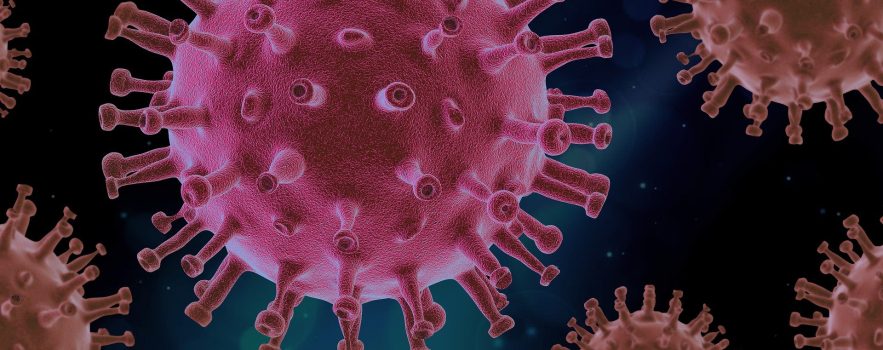An international consortium led by MRC researchers has developed an open access platform to help prioritise drug discovery and repurposing efforts for the current COVID-19 pandemic. The platform provides information on the genetic variation of host proteins involved in SARS-CoV-2 infection, based on analysis of genetic and proteomic data from 10,708 Fenland Study participants.
Viruses such as SARS-CoV-2 infect humans by binding to normal host cell proteins and hijacking host cellular machinery to replicate and proliferate. Severe illness from SARS-CoV-2 infection, termed COVID-19, may also result from tissue damage in the lung, blood vessels and elsewhere, arising due to a dysregulated host inflammatory response.
Relevant host proteins might serve as targets of drugs to block viral entry, inhibit viral proliferation, or to dampen the damaging host inflammatory responses. Naturally occurring variation in genes that affect the amount or function of such proteins might alter susceptibility to SARS-CoV-2 infection or to developing COVID-19 illness, and this information can be used to help prioritise which of these proteins might be targets for new drugs or indeed for established drugs that are currently used to treat other conditions.
In the present work published in Nature Communications, an international consortium led by Dr Claudia Langenberg from the MRC Epidemiology Unit and the Berlin Institute of Health, Charité University Medicine, Germany, and including partners from institutions in the UK, Germany and USA, identified common variations in the human genome linked to 179 proteins shown to be involved in SARS-CoV-2 infection or severe COVID-19. These 179 proteins were identified with the aid of the SomaScan assay, the most comprehensive proteomic technology available to date. The SomaScan assay utilises a library of aptamers, short single-stranded DNA molecules which are chemically modified to specifically bind to protein targets, with the relative amount of aptamers binding to protein targets determined using DNA microarrays.
The team assessed these COVID-19 relevant candidate proteins in more than 10,000 healthy Fenland Study participants to identify genetic variants that regulate the way that they interact with SARS-CoV-2, or which may contribute to the adverse host responses to SARS-CoV-2 infection.
The Fenland Study is a cohort whose participants were born between 1950 and 1975 and lived in Cambridgeshire, UK, at the time they were recruited, and who have undergone detailed genetic profiles as well as with objective measurement of resting metabolic rate, cardio-respiratory fitness, physical activity energy expenditure, and body composition. The recruitment of relatively young individuals before chronic disease onset was designed to investigate early processes and pathways to metabolic disease unaffected by therapy or co-existing disease.
The team identified 220 genetic variants that corresponded with 97 of the 179 investigated host proteins and which explain up to 70% of the variance in SARS-CoV-2 response for these proteins, including 45 proteins for which such variants had not previously been identified, and 38 corresponding to proteins that are current drug targets.
Dr Maik Pietzner, the first author of the study and also at the MRC Epidemiology Unit, explains:
Our results enable rapid testing of protein differences that are relevant for COVID-19 using genetic data that is being gathered around the world.”
Professor Aroon Hingorani from the UCL BHF Research Accelerator and UCLH NIHR Biomedical Research Centre, who co-leads one of the NIHR-BHF Cardiovascular Partnership Covid-19 Flagship Projects adds:
These findings may help to prioritise potential new compounds or existing drugs currently used for other purposes that target these proteins to help prevent, treat or reduce complications from SARS-CoV-2 infection.”
To enable rapid sharing of results with the scientific community the investigators worked with collaborators at the Helmholtz Centre Munich to create a publicly available web resource, which has since been used by investigators around the world to prioritize drug targets and gain deeper insights into the pathophysiology of COVID-19.
Dr Langenberg says:
Even before our work was officially published, papers appeared on preprint severs that made use of our findings. This is exactly what we hoped to achieve”.
Reference
- Pietzner M, Wheeler E, Carrasco-Zanini J, Raffler J, Kerrison ND et al. Genetic architecture of host proteins involved in SARS-CoV-2 infection. Nature Communications, 16 December 2020. DOI: 10.1038/s41467-020-19996-z
- Omicscience open access platform: https://omicscience.org/apps/covidpgwas/

 MRC Epidemiology Unit
MRC Epidemiology Unit